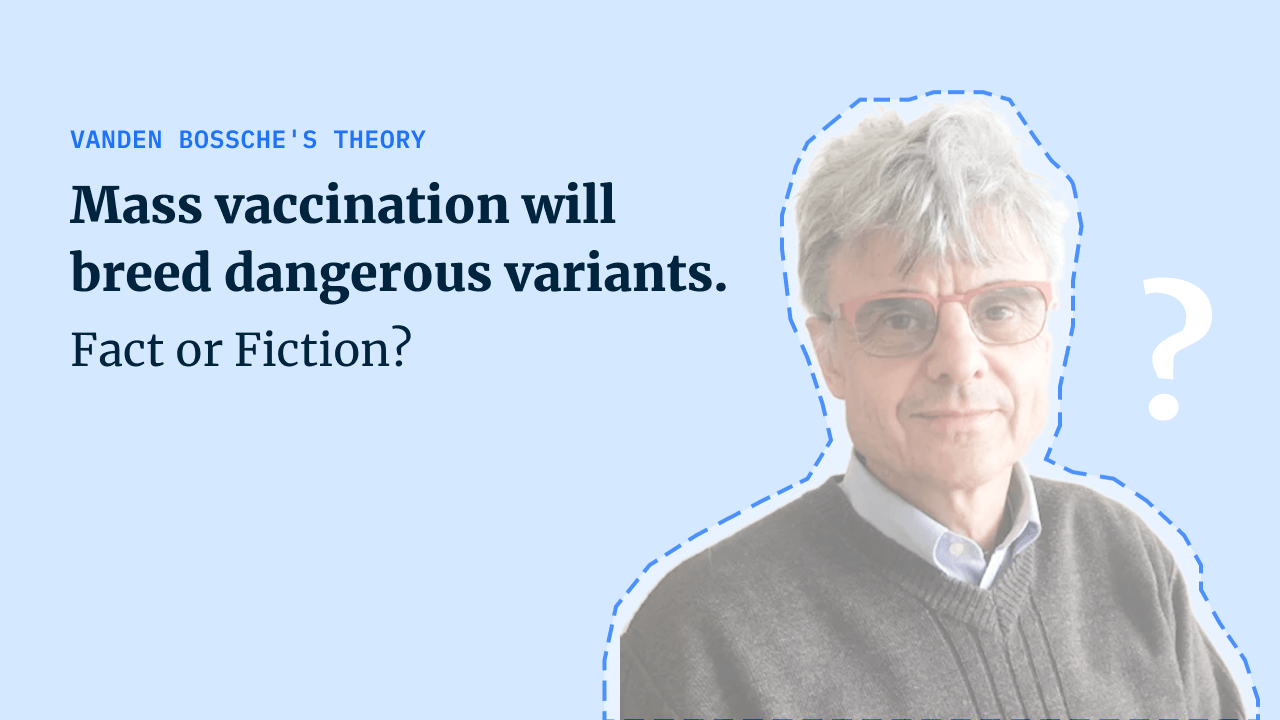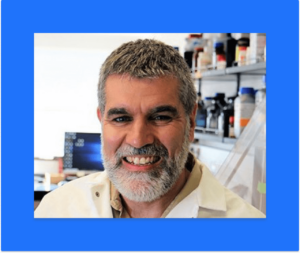Vanden Bossche’s Theory: Mass Vaccination Will Breed Dangerous Variants – Fact or Fiction?

Background
The two posts I made regarding Vanden Bossche’s theory which claims mass vaccination is “transforming a quite harmless virus into an uncontrollable monster” attracted a lot of interest. Naturally people were then eager to know if it had truth.
I considered it having some degree of credibility, else I’d not have published it. However my cause is five-fold:
Struggle to maintain the power or right to express one’s opinions without censorship, restraint, or legal penalty. Second, the protection of sufficiently broad public discourse. Third, the protection of scientific discovery, a process which requires the free exchange of ideas. Fourth, provision of counterbalance to propaganda, namely biased or misleading information provided by mainstream media, typically in support of a political cause or point of view. Fifth, an extra voice for the more vulnerable in society; children, elderly, the sick and the poor.
Once something seems to have a degree of credibility and it’s censored by big tech (or looks likely to be censored), I add it to a list for consideration of publication.
Because of the interest expressed, I decided to have a first-round of validity scoring. I pinged three top-scientists, namely:
- Dr Byram Bridle, Viral Immunologist
- Dr Knut Wittkowski, Epidemiologist
- Dr Mike Yeadon, Former Vice President and Chief Science Officer for Pfizer
And asked their thoughts in a few email exchanges.
I’ve posted their raw unedited emails below, along with the biography of each.
If there’s more interest, I’ll go to a round-two of validity scoring, taking into account the input below.
Dr Byram Bridle
BIOGRAPHY

Dr. Byram Bridle is an Associate Professor of viral immunology at the University of Guelph. His research program focuses on the development and optimization of vaccines for the treatment of infectious diseases and cancers. In March of this year he and two of his colleagues were commissioned by the government of Ontario to engineer several potential vaccine candidates to provide protective immunity against severe acute respiratory syndrome coronavirus-2 (SARS-CoV-2), which is the causative agent of the coronavirus disease that emerged in 2019 (COVID-19).
In collaboration with the National Microbiology Laboratory in Winnipeg, Manitoba, one of the vaccine candidates proved effective in protecting hamsters from COVID-19. This resulted in a contract being established with the National Research Council of Canada (NRC) to develop a manufacturing process for the vaccine. A second contract has been established with the NRC to advance a second-generation CVODI-19 vaccine into the translational research pipeline. Dr. Bridle has also co-authored a series of lay articles in The Conversation to provide information to the lay public about the immunological aspects of COVID-19 and the development of vaccines.
His thought
EMAIL 1
Although Geert gets there by a slightly different route, we both end up at the same conclusion: that current design of the vaccines and the way they are being rolled out creates risk of the emergence of immunoevasive variants.
EMAIL 2
I don’t agree 100% with some of the minutiae of the scientific arguments, but that is a moot point.
I long ago drew a similar conclusion via a slightly different route through immunological and virological principles.
In short, I agree with the big picture argument being made.
I haven’t been so bold as to draw conclusions that are as ‘strong’, but I can’t disagree at all with Geert’s take-home message.
He is a respected scientist and has published many papers in well-respected journals. I can guarantee that he knows what he is talking about. I do think there is a high probability of our vaccine rollouts driving the emergence of dangerous variants.
In fact, I just initiated intense communications with my local health unit because they have just started a series of vaccination clinics and are not following the protocols approved by Health Canada (our regulatory agency).
In fact, Canada has unwisely chosen to be a ‘leader’ in extending the interval between the two doses of the COVID-19 vaccines to four months! There is no precedent in the world and no empirical data to back-up the decision. It was based on epidemiological modeling that had to incorporate several ‘assumptions’. All they focused on was theoretical effects on the immune system. They failed to consider effects on the virus.
Canada’s rationale is that it is better to get twice as many people with sub-optimal immunity for an extended period of time rather than maximal immunity in half the people. This is akin to having an outbreak of a dangerous bacterium but not enough antibiotics to go around. If one were to choose to administer the antibiotics for half the recommended # of days but to twice as many people, most scientists would agree that this would be an ideal scenario to promote the emergence of dangerous antibiotic-resistant variants. Physicians tell their patients to complete their antibiotic regimen, even when they start feeling much better part way in. To cut the treatment short = potentiation of risk of driving antibiotic resistance.
So why are we doing this in the context of SARS-CoV-2?!? The vaccine rollouts are already being done in a way that will drive the emergence of what we call ‘antigenic variants’; these are versions of the virus that have incorporated sufficient mutations to allow the target antigen (in this case, the spike protein) to change enough in structure as to become unrecognizable by the highly specific antibodies and T cells that were induced by the vaccines.
Specifically, the vaccines are being rolled out very slowly and are being distributed here and there (i.e. in piecemeal fashion). This means that vaccinated people will be intermingling with unvaccinated individuals. The latter can serve as a reservoir in the which the virus will have lots of time to incorporate random mutations and ‘test’ its ability to infect vaccinated people. If the latter happens, it would be result of an immuno-evasive variant emerging.
Adding unvalidated uses of the existing vaccines will only accelerate progress to this point. If a variant emerges that can bypass the immunity conferred by all current vaccines, we will be back to ‘square one’ and all our lockdowns for the past year will have been of zero net benefit.
We already have clear evidence this can happen: the Novavax, Johnson & Johnson, and AstraZeneca vaccines have all performed much poorer against the South African variant; AstraZeneca’s provides very little protection against it.
An article that backs this concept of vaccines driving antigenic variation was accepted for publication two days ago:
Antibody Resistance of SARS-CoV-2 Variants B.1.351 and B.1.1.7
…here are some concerning quotes:
“The recent emergence of B.1.1.7, B.1.351, and P.1 marks the beginning of SARS-CoV-2 antigenic drift”; “If the rampant spread of the virus continues and more critical mutations accumulate, then we may be condemned to chasing after the evolving SARS-CoV-2 continually, as we have long done for influenza virus.”
With respect to this latter statement, I have been convinced for a long time that SARS-CoV-2 will become endemic, just like influenza. This is the precise reason why I have tried to advocate for ‘learning to live with the virus’ since shortly after the pandemic began.
Importantly, the authors of this paper conclude that the way to avoid this is to maximize immunity as quickly as possible. Indeed, if vaccines are used in this way, an outbreak can be stopped in its tracks and there would be insufficient time and reservoir populations would be too small to support emergence of variants.
However, the authors are dreaming if they think our global vaccine rollout can be done in this proper way. It will never be fast enough. Everything we are doing in the vaccine rollout, in fact, is potentiating the emergence of variants.
It upsets me because public health officials are, in essence, driving the emergence of new variants that put you and me, and our families, friends and colleagues at risk of having to deal with potentially more dangerous version of this virus.
Personally, I would like to have much broader immunity than what the current vaccines induce. Broader immunity = less chance that a variant can evade it (because they can’t change too many components and maintain fitness).
By the way, the virology side of this is that coronaviruses naturally mutate over time. They employ an error-prone polymerase that randomly incorporates mutations when they copy their genetic material. This is a strategy that helps them adapt to new environmental pressures; such as narrowly-focused immunological pressure (and weak immunity caused by massive delays in administering second doses of vaccines).
An additional note: Some have argued that the emergence of partially immunoevasive mutants of SARS-CoV-2 prior to the rollout of vaccines invalidates the idea of vaccines potentiating this effect. However, one could argue that this observation actually supports the idea. The extended global lockdowns dramatically slowed progress towards natural immunity. Time and slow development of herd immunity = potentiation of immunoevasive mutants.
Dr Knut Wittkowski
BIOGRAPHY

Dr. Wittkowski received his PhD in computer science from the University of Stuttgart and his ScD in Medical Biometry from the Eberhard Karls University of Tübingen, both Germany. He worked for 15 years with Klaus Dietz, a leading epidemiologist who coined the term “reproduction number”, on the Epidemiology of HIV before. Around 1990, he was one of the few to predict that HIV would not spread among Caucasian heterosexuals. After teaching epidemiology at the University of Cairo and the American University of Beirut, he was for 20 years head of Biostatistics, Epidemiology, and Research Design at The Rockefeller University, New York.
Dr. Wittkowski is currently the CEO of ASDERA LLC, a company discovering novel interventions against complex diseases from data of genome-wide association studies, including a nutritional intervention to reduce cellular support for virus replication and to improve cardiovascular and metabolic health as a natural strategy to reduce the burden and stop the continuation of the COVID epidemics.
His thought
EMAIL 1
It’s mitigation [e.g. lockdowns] that gives a virus more time. Vaccination is the opposite: it speeds up time to herd immunity.
EMAIL 2
I’m trying to find some logic in his arguments, that would relate to what we know about epidemiology, but I can’t.
Vaccination speeds up the development of herd immunity by reducing the wait time until the same person gets infected naturally. Speeding up the buildup of HI [herd immunity] reduces the chance that a lineage will successively develop escape mutations against all antibodies generated by the polyclonal immune response and thereby become resistant.
Hence, vaccination – if still effective when implemented – can be helpful, unless the politicians counteract the beneficial effect of vaccination (speeding up the development of HI) by mitigation (“distancing”, lockdowns, curfews, … ), all of which prolong the time it takes to develop HI.
One could argue that vaccines create fewer antibodies and, thus, increase the chance for shorter lineages to escape, but I can’t find this argument in his writings.
EMAIL 3
In a one-page summary written by him, some of his basic flaws are much easier to find:
“Why is nobody worried about ‘immune escape’ whereas Covid-19 has already escaped people’s innate immunity as reflected by multiple emerging, much more infectious, viral variants (most likely due to the global implementation of infection prevention measures)?”
In this sentence alone, he makes three fundamental mistakes:
- I am worried about immune escape, as are many other people, see Wang … Ho (2021, Nature). The assumption that nobody is worried is wrong.
- The escape we see is not from innate immunity (which are not specific to a particular pathogen), but from adaptive immunity (T-cells, antibodies, which are specific to a particular virus).
- I agree that the problem is “global implementation of infection prevention measures”, but the lockdowns are the problem, not the vaccines. It is the lockdowns that are “transforming a quite harmless virus into an uncontrollable monster.”
EMAIL 4
I would replace [Geert’s claim of] “research expert” with “research coordinator” – “I was a coordinator of the Ebola program at GAVI. So we were interacting with several different vaccine companies …”. Role of a coordinator.
He is a PhD and DVM (veterinarian physician) not an MD.
He is not “board certified” in human virology or microbiology.
“Self-limiting diseases” – that’s COVID.
Viruses are not “intracellular”.
COVID is not “chronic” (chicken pox and herpes are) SARS-CoV-2 gets cleared.
Antibodies do not “translate to the mucosa”. The mucosa is where we have innate immunity.
Viruses don’t hide in cells, they get replicated in cells.
Viruses don’t “fully escape to [sic] our antibody responses.” We have neutralizing antibodies against viruses circulating in blood and we have non-neutralizing antibodies that direct killer T-cells to infected cells.
I agree with “it was a bad idea to do lockdowns that would also affect the younger people”.
The new “COVID strains” are not so much more infectious that young people need to be afraid of them. Maybe a few more become (mostly) asymptomatically infected. That’s it.
A virus doesn’t initially get “to the folks that have … weak immunity”. It infects everybody the same, but those with “weak immunity” may have more severe symptoms.
I agree that it would have been “the right thing to do, to protect [the elderly], and for them also to isolate, but … that is what we have not been doing.”
“If [young people] have quite decent innate immune response and therefore they are naturally protected … if they get in contact with coronavirus, it will boost their natural immunity.” – you can’t “boost” innate immunity.
“Vulnerable people [have] no humoral immunity”. Humoral immunity is the adaptive antibody mediated immunity. Except for newborns, everybody has it.
The older you get, the more types of memory t-cells you have to make different types of antibodies.
Innate immunity does not get “replaced by antigen-specific “immunity as people get older.” Partly true, it becomes less important as we develop more antibodies. (Note that he is later arguing that vaccines weaken the innate immunity.)
“Prophylactic vaccines should typically not be administered to people who are exposed to highly infectious pressure.” ???
“We are administering these vaccines in the heat of a pandemic … while … we are fully attacked by the virus”. – So what? That’s normal.
Among “people who get their first dose … the antibodies are not fully mature [sic], the titers are maybe not very high [that could be]. So their immune response is suboptimal [and] every single time you have an immune response that is suboptimal in the presence of an [infection/virus] … you are at risk of immune escape.” – Nonsense! … and then more nonsense.
“These vaccines don’t prevent infection” – No vaccine does.
“But in the meantime, … we give … by our interventions, the opportunity to escape to [sic] the immune system.” – Correct, but this applies to the lockdowns, not the vaccinations.
“The virus is not going to wait until we have those vaccines ready”. – Correct, but this merely makes the vaccine ineffective.
“… antibiotics …” are a bad example, because antibiotics evolve in the patient (with mutations every couple of hours), viruses evolve in the population (with 1-2 mutations per month).
EMAIL 5
Since Geert Vanden Bossche is now pushing “natural antibodies“ I looked into this in a bit more detail, the term has been used by some Boyden (196..) and Ochsenbein (1999), and recently reviewed by Palma (2018) and Holodick (2017), but it‘s nothing else than a subset of (mostly) IgM. There are none of the potentials or dangers pushed by GvdB associated with it. Newborns have a lot of them as part of the innate immune system and children lose most of them as soon as they develop adaptive immunity (antibodies).
It‘s still funny that somebody just created a more-or-less empty Wikipedia page for “natural antibodies“ and linked that page to “Antibodies“.
Dr Mike Yeadon
BIOGRAPHY

Dr Mike Yeadon is the former CSO and VP, Allergy and Respiratory Research Head with Pfizer Global R&D. Following 32 years at Pfizer he co-founded biotech company Ziarco Pharma Ltd. which was acquired by pharma giant Novartis.
Mike obtained a biological sciences Double First with Honours, and research based PhD in mechanisms of drug action.
His thought
EMAIL 1
His article has little science in it but lots of claims, the basis of which I cannot understand. He appears to have completely ignored T-cell immunity.
In terms of immune escape, additional publications to me support the idea that it’s extremely unlikely (whether that immunity is natural or due to vaccination).
EMAIL 2
No, I don’t agree with him that vaccination at present will lead to escape variants.
He chose not to address how it could be that variation could even begin to favour mutants which aren’t recognised in part by the vast majority of short pieces of the virus which are not altered.
Each individual uses a kind of combination lock, educating our T cells & also our antibodies to recognise between 20 & 40 separate protein snippets of the 10,000 amino acids that make up the virus.
The most changed variants are less than 0.3% different from the original sequence from Wuhan. So these are 99.7% identical to the original. It’s not possible that our bodies will not recognise every single variant as very close relatives of the original. No ones immune system will be fooled into thinking “this is a new virus, a new pathogen I’ve not seen before”.
The most important thing to communicate is how unlikely it is to evade what’s called “multi locus immunity”. It would be, probabilistically, as if the virus rolled a dice & got 20 sixes in a row (not quite, but this is the idea).
But let’s say it happened once. If there are enough replication events, maybe it will happen. Worst case is that individual may well be at risk, as if they had a suppressed immune system.
Here’s the reassuring part: because each of us uses a slightly different combination lock as we educate our immune systems through a kind of “molecular identity parade”, checking responses to hundreds of different protein snippets.
My selected set of 20-40 snippets which confers my immunity to this virus is DIFFERENT from the set of snippets another persons immune system is using.
So even if there’s an unlikely variant which escaped my combination lock immunity, it will not have escaped yours.
Put plainly: I do not believe immune escape mutants are at all likely to have clinical consequences but the most important thing is that even if escape happened, it would represent a threat to an individual, NOT to the community.
I do not understand how our Belgian colleague accommodates that concept, which has been demonstrated empirically in scores of convalescing people as well as those who’s immunity was conferred through vaccination.
But to finish on a positive note, I agree with his operational conclusion: do not vaccinate everybody.
We have different rationales for our conclusions, but those recommendations are pleasingly convergent!


More Resources: